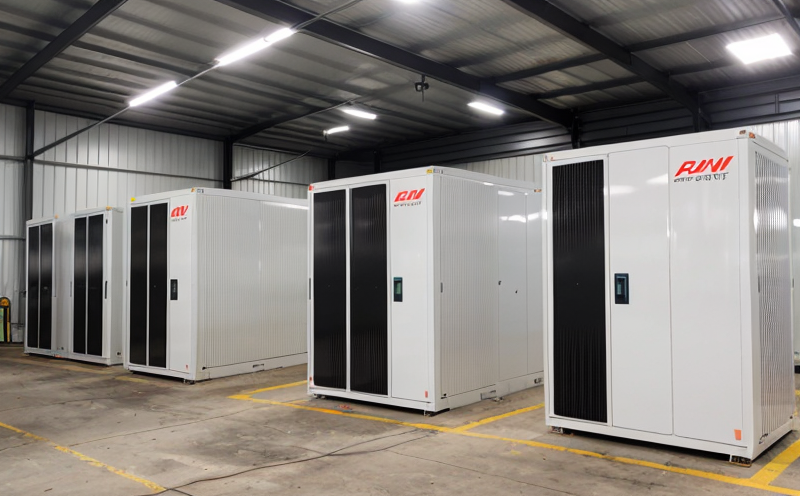UL 1973 Battery Systems for Stationary Applications Safety Testing
The UL 1973 standard is a crucial document that sets the safety requirements for battery systems intended for stationary applications such as energy storage systems (ESS) and uninterruptible power supplies. This service ensures that batteries used in these applications meet stringent safety standards, thereby protecting both people and property.
UL 1973 testing covers a wide range of aspects including but not limited to: thermal runaway mitigation; electrical insulation integrity; mechanical integrity under impact conditions; flammability; and the ability to withstand over-temperature and over-voltage conditions. The standard is designed for lead-acid, lithium-ion, nickel-cadmium, and other chemistries commonly used in stationary applications.
The testing process involves rigorous evaluations of individual battery cells or modules as well as complete systems. Key components evaluated include the battery management system (BMS), thermal protection devices, and connectors. The service ensures that these components are capable of preventing hazardous situations such as overheating, overcharging, and short circuits.
During testing, specimens are subjected to a series of controlled conditions designed to simulate real-world scenarios. For instance, cells or modules may be exposed to extreme temperatures (both hot and cold), high voltage stress, and mechanical abuse. The testing apparatus used includes environmental chambers capable of maintaining precise temperature profiles, power supplies for simulating voltage stresses, and impact testers.
The UL 1973 service also involves detailed documentation of test procedures and results. This comprehensive report is essential for quality managers and compliance officers to ensure that their products meet regulatory requirements and are safe for deployment in various stationary applications.
For R&D engineers, this testing provides critical insights into the performance characteristics of different battery chemistries under controlled conditions. The data obtained can be used to improve design parameters and enhance the overall safety profile of future product generations.
Scope and Methodology
The scope of UL 1973 testing covers all aspects related to the safety evaluation of batteries intended for stationary applications. This includes both individual battery cells and complete systems comprising multiple cells or modules.
- Thermal Runaway Prevention: Testing is conducted to ensure that any thermal runaway within a cell does not spread to adjacent cells or modules.
- Electrical Insulation Integrity: Evaluation of the insulation properties under various stress conditions including high voltage and temperature.
- Mechanical Integrity: Assessment of how well the battery can withstand mechanical forces such as impact or vibration without compromising safety.
- Flammability: Examination of the flammable characteristics to ensure they do not pose a significant fire hazard.
The methodology involves precise control over environmental conditions, application of standardized test protocols, and rigorous documentation. The testing apparatus includes specialized chambers for temperature regulation, high-voltage power supplies, impact testers, and other relevant equipment necessary for accurate evaluation.
Benefits
- Enhanced Safety: Ensures that batteries used in stationary applications are safe from hazards like overheating, short circuits, and fires.
- Regulatory Compliance: Helps manufacturers comply with international safety standards such as UL 1973.
- Improved Product Quality: Provides valuable data for R&D teams to enhance product design and performance.
- Consumer Trust: Builds confidence among end-users by demonstrating a commitment to high safety standards.
The UL 1973 Battery Systems for Stationary Applications Safety Testing service offers comprehensive support throughout the entire testing process, from initial consultation through final report preparation. This ensures that all aspects of battery system safety are thoroughly evaluated and documented, providing peace of mind for those responsible for quality assurance.
Industry Applications
- Energy Storage Systems (ESS): Ensures the safe operation of ESS used in utility-scale applications and residential installations.
- Uninterruptible Power Supplies: Provides assurance that UPS systems are reliable and do not pose safety risks to critical infrastructure.
- Solar Energy Systems: Supports the integration of solar storage solutions into renewable energy projects by ensuring battery safety.
The UL 1973 service plays a vital role in promoting the adoption of safer, more reliable stationary batteries across various sectors. By providing robust safety testing, this service contributes significantly to the advancement of sustainable and efficient energy systems worldwide.





